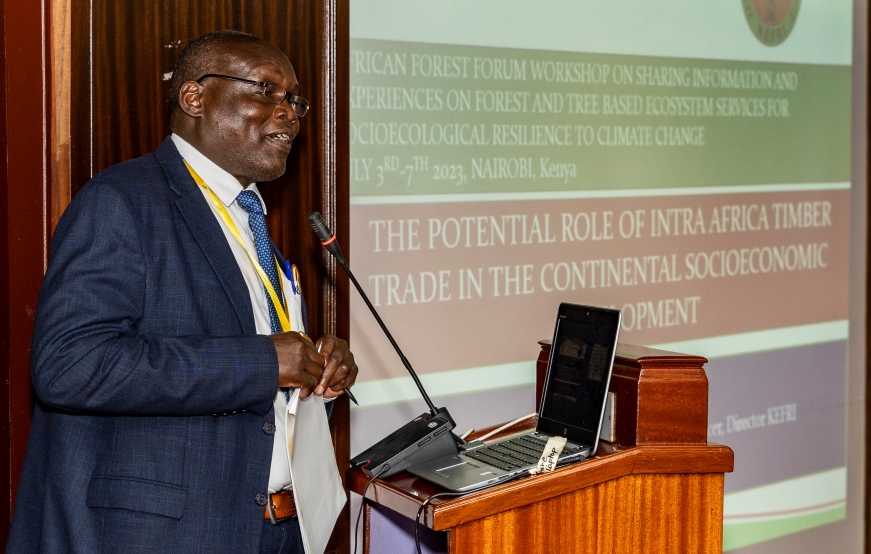Kenya has over 2.6 million hectares of gazetted forests, spread out over 8.83% of the country’s land mass. This is up dramatically from about 3% just 5 years ago. The country boasts a variety of forest types, from rainforests to mangroves, montane forests, dry forests, and, of course, plantation forests. This natural capital plays an important role across multiple economic sectors such as water, agriculture, energy, tourism, fisheries, etc.
The African Forest Forum has unlocked government interest in protecting forests, and helped experts create an infrastructure that not only solves problems here but leads to solutions that benefit Kenya’s neighbours and other nations farther afield. By empowering them with knowledge, supporting new facilities and being a conduit for shared information, the organisation amplifies its impact well beyond Kenya’s borders.

Dr. Joshua Cheboiwo has been the Director of the Kenya Forestry Research Institute for six years and been in leadership positions at the institute for more than 3 decades. KEFRI, as it is known, has grown into one of the most prestigious research institutions on the continent. Joshua retired last year but feels he has prepared his colleagues to continue his legacy, especially as they are aided by the African Forest Forum.
Joshua is another forestry leader who has been sensitised to the needs of the local communities around the trees. He has given himself a mission to aid the marriage of forests and agriculture, realising that farmers need space, but that they can be motivated to share it.
“It took me a lot of time to really convince forestry practitioners that socio-economics, policy and law play critical factors in forest management, because they guide in defining the roles and responsibilities of those who are engaged. Also, forests were for the public, and at the time there were no forests on farms, as the sector had not envisioned farmers becoming part of forest production. Farmers are now tree growers for the market, which is something that I'm very proud of. I am proud of those who have been part of it, putting it in the training, building capacity and then synergy. We now have a lot of players who are supporting tree growing on private land, and also on farms, as a business,” asserts Joshua.
He engaged with AFF when it was in its early programme development stage, as far back as 2014. He read a publication the organisation had published on plantation forest management in East Africa. Joshua found it a valuable resource, describing how different countries were practicing their forestry and their level of management and productivity.
When AFF was looking for consultants to map trade in forest products in eastern Africa, Joshua was there. He had already built networks in eastern and central Africa, for monitoring tree products, which moved into Kenya, and had also assessed the sustainability of timber production in those countries.
So, when that particular call for interest showed up, he submitted a bid and led experts in six eastern Africa countries in developing the methodology, research, analysis and writing the report to see the status of movement or products across the countries and within the countries. It was his first contribution to AFF’s rich trove of research and information.
The most recent concern to conservationists across the continent has been climate change. The situation has changed drastically in a short amount of time. And Africa, a small contributor to greenhouse gases emission, is affected disproportionately. The African Forest Forum has again answered the call, putting attention and resources into understanding the effects of global warming, but also how to mitigate and adapt to its adverse effects. Joshua has had a front row seat.
“African Forest Forum started bringing to the attention of governments in Africa issues that are of interest to this country such as climate change. It's still a new topic for most of us, understanding the dynamics, building documentation, and so on were being done and coordinated by African Forest Forum, which brought all the Sub-Saharan countries together to understand how together, we can deal with it at the continental level, and then sub-continental level. African Forest Forum has made efforts in building the capacity of the future leaders to understand climate change and how to address it, through forest and tree-based mitigation or adaptation and building capacity, up to even negotiating at the policy level. They did good work bringing together policymakers, to know how to negotiate together as a continent at international fora.”
The 18 scientists working at KEFRI will continue to depend on AFF to supply them with information. They, in turn, will gladly contribute what they can, so that their peers from around the continent, and indeed, around the globe can use research results and knowledge to protect forests and enrich human lives in the process.


